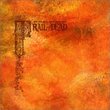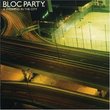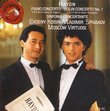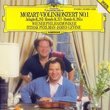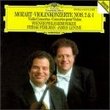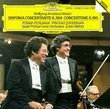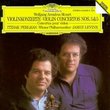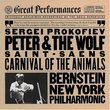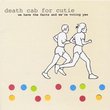| All Artists: Thomas Ades, City of Birmingham Symphony Chorus Title: Thomas Adès: America: A Prophecy Members Wishing: 2 Total Copies: 0 Label: EMI Classics Release Date: 2/24/2004 Genres: Special Interest, Pop, Classical Styles: Vocal Pop, Opera & Classical Vocal, Chamber Music, Forms & Genres, Rondos, Short Forms, Historical Periods, Baroque (c.1600-1750), Classical (c.1770-1830), Modern, 20th, & 21st Century, Instruments, Keyboard Number of Discs: 1 SwapaCD Credits: 1 UPCs: 724355761026, 724355761057 |
Search - Thomas Ades, City of Birmingham Symphony Chorus :: Thomas Adès: America: A Prophecy
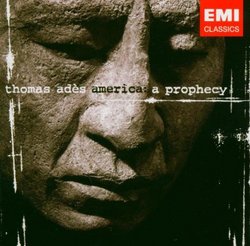 | Thomas Ades, City of Birmingham Symphony Chorus Thomas Adès: America: A Prophecy Genres: Special Interest, Pop, Classical
|
Larger Image |
CD DetailsSimilarly Requested CDs
|
CD ReviewsDon't fall for hype: entertaining the first time, clearly de Christopher Culver | 10/29/2006 (1 out of 5 stars) "In the 1990s, Thomas Ades benefitted from one of the largest hype machines the classical music world had ever seen. This young composer, born in 1971, was the great hope of British music, the next great master after Britten (somehow Benjamin, Harvey, and Birtwistle were pushed aside), and just the man to bring classical music to the masses. That's a tall order, and one's disappointment in Ades' music deepens all the more because of the glory one was lead to expect. Some of his earlier work, such as "Asyla" and "These Premises are Alarmed", showed him a decent orchestrator, but the man's work has many weaknesses. These continue in this 2004 EMI disc, collecting ten of his pieces. "America: A Prophecy" (1999) is the largest work here in terms of length and proportions. It was written for mezzo-soprano, chorus, and orchestra for the New York Philharmonic's "Messages for the Millennium" project. Ades sought to contrast the comfort of New York at the time with the bloody way in which the Americas were conquered, so he paired Mayan prophecies from the Chilam Balam with conquistador songs of bravado. Lines like "They will come from the East" and "They will burn your cities" made the piece especially poignant after September 11, 2001. Though the work is entertaining on the first listen or two, especially due to the odd vibrato-less mezzo-soprano, it gets old real soon. There's no subtlety here, Ades either bangs it out with massive orchestral and choral bombast with no economy, like Sandstrom's awful "High Mass", or keeps it real quiet. At both extremes, we get generally the same sonorities of "Asyla", which were cute before but now just seem sappy. I first heard "America: A Prophecy" over a year ago, it's taken me this long to tame my annoyance enough to review it, it's that bad. Several chamber works primarily for voice follow, setting ancient or medieval texts. These are all quite lightweight, some of them even lack opus numbers, making one wonder how much work the composer put into them. "January Writ", for chorus and organ, seems fairly easy and might prove a hit with regional choruses. The others, however, are dull. "Life Story", here in an arrangement for soprano and a chamber ensemble of string bass and two bass clarinets, is just as unimpressive as the first time it appeared on disc for soprano and piano: if all you do is have your soprano sing like Billy Holliday, it's not all that exciting. One reason "Asyla" got so much attention was because of its third movement, titled "Ecstasio". In 4/4 time, it evoked the bass/hi-hat alteration of house music and imitated the trippy synths of trace with woodwinds. Trying to follow in that success, this disc contains Ades' chamber setting of a 1982 ska rock hit by Madness, "Cardiac Arrest". Unlike Olga Neuwirth's "Hommage a Klaus Nomi" which supplements the arrangement with a strong dramatic spectacle, Ades' arrangement of "Cardiac Arrest" just sounds gimmicky. So an ensemble can imitate a rock song, so what? This is followed by Ades' arrangement of a Couperin harpsichord piece, where yet again any insight is lacking. If you're interested in contemporary music from Britain, look for anything by George Benjamin or Julian Anderson, two composers whose music has some substance behind the surface glitter. Considering how far Ades' career had moved along by the last works here, it's appalling that he still hasn't shown anything underivative and rigourous." More than hype kamus | United States | 06/06/2008 (5 out of 5 stars) "Again, I have to echo Mr. Hamilton's fine and accurate review. I would just like to add that I was largely unaware of any hype about Ades before I was exposed to his music. As a matter of fact, I was somewhat negatively predisposed to him due to reading something critical about him. I must say I was unprepared for the impact his music had on me, Beyond his technique which itself, is extraordinary, lies a brilliant, fecund imagination that seems to have absorbed just about everything in Classical music that had preceded him while delivering that synthesis of technique and ideas in an utterly original manner. His command of the resources of tonality and "atonality" is astonishing, always acutely aware of the play of tonality or it's lack upon the listener, which is more than I can say about a depressing percentage of contemporary composers. There is a deep tonal logic to his music and the listener is well rewarded by following the thread of his musical argument, surreal as it is many time.For me, some highlights included the title piece which is as powerful as it is chilling, with or without the unintended 9-11 link. The songs are exquisitely wrought with the polytonal clouds of piano notes surround the arch melodies always sounding curiously inevitable. The man is demonstrably a genius IMO, and this music bears witness to that, Sometimes, by accident the hype is accurate." New Music Can be Fun Giordano Bruno | Wherever I am, I am. | 10/05/2006 (5 out of 5 stars) "The two-year-old review by Mr. Hamilton describes the contents of this disk very amply and cogently. No two pieces resemble each other in any but technical matters of harmony. Ades is at times as spiritual as Arvo Part, at times as whimsical as Ives or Couperin, whose "Mysterious Barricades" he recomposes. These little pieces are, for me, more enjoyable than the larger compositions of Ades that I've heard. Perhaps there is room in contemporary music for a brilliant miniaturist. I rather hope so."
|

 Track Listings (15) - Disc #1
Track Listings (15) - Disc #1